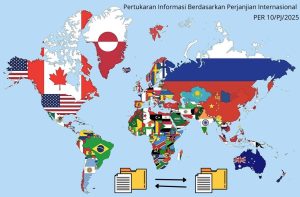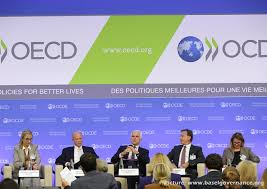
Dunia gobal akhir-akhir ini tengah menghadapi isu geopolitik yang memanas diawali dengan perang antara Iran dengan Israel, Rusia dengan Ukraina dan India dengan Pakistan yang hingga sampai saat ini masih berlanjut dan di sisi lain perang dagang juga terjadi antara negara-negara maju. Tentunya keadaan ini memicu ketidakstabilan pasar sehingga berdampak langsung terhadap alokasi harga dan laba perusahaan multinasional. Dalam hal ini yang menjadi soroton yaitu transfer pricing. Transfer pricing menjadi soroton karena dalam berbagai kasus, terdapat koreksi atas kewajaran harga dalam afiliasi antar negara yang menjadikan potensi pajak berganda (double taxation).
Dalam menghadapi gejolak ketidakpastian global, Pemerintah melalui Kementerian Keuangan mengeluarkan Peraturan Direktur Jenderal Pajak PER-10/PJ/2025 Tentang Pelaksanaan Pertukaran Informasi Berdasarkan Perjanjian Internasional. Dengan adanya perjanjian internasional diharapkan pemerintah telah mengikatkan diri dengan negara mitra atau yuridiksi mitra mengenai kerja sama atas hal yang berkaitan dengan pertukaran informasi. Pertukaran informasi sebagaimana yang tercantum dalam pasal 1 ayat 4 merupakan pertukaran informasi untuk kepentingan perpajakan, yang dilakukan oleh pejabat yang berwenang berdasarkan perjanjian internasional bertujuan untuk:
- Mencegah penghindaran pajak;
- Mencegah pengelakan pajak;
- Mencegah penyalahgunaan persetujuan penghindaran pajak berganda oleh pihak-pihak yang tidak berhak; dan/atau
- Mendapatkan informasi terkait pemenuhan kewajiban perpajakan wajib pajak.
Pelaksanaan pertukaran informasi merupakan wewenang Direktur Jenderal Pajak yang dilaksanakan dengan pejabat yang berwenang di negara mitra atau yuridiksi mitra sesuai dengan pasal 3 ayat 1. Dalam rangka pelaksanaan pertukaran informasi Direktur Jenderal Pajak dapat melakukan: (1) competent authority meeting, (2) tax examinations abroad, dan/atau (3) simultaneous tax examination.
Bagaimana Simultaneous Tax Examination (STE) dapat berperan sebagai pencegahan pajak berganda dalam sengketa transfer pricing?
Berdasarkan PER 10/PJ/2025 pasal 1 ayat 12 simultaneous tax examination dapat di definisikan sebagai kegiatan pencarian dan/atau pengumpulan informasi melalui pemeriksaan yang dilaksanakan di Indonesia dan di satu atau lebih negara mitra atau yurisdiksi mitra, secara simultan dan independen berdasarkan kesepakatan para pejabat yang berwenang, dengan tujuan untuk mendapatkan dan mempertukarkan informasi yang relevan dari hasil pemeriksaan dimaksud. Berdasarkan pasal 9 ayat 2 simultaneous tax examination dapat dilaksanakan dalam hal sebagai berikut:
- Terdapat keterkaitan permasalahan perpajakan antara wajib pajak negara mitra atau yuridiksi mitra dengan wajib pajak Indonesia;
- Terdapat kepentingan bersama antara satu atau lebih otoritas pajak di negara mitra atau yuridiksi mitra dengan Direktur Jendral Pajak terkait permasalahan perpajakan;
- Terdapat dugaan bahwa transaksi dan/atau kegiatan dilaksanakan untuk melakukan penghindaran pajak dan/atau pengelakan pajak.
Pelaksanaan simultaneous tax examination merupakan tanggapan atas respon adanya dugaan melakukan penghindaran pajak dan/atau pengelakan pajak yang melibatkan lebih dari satu negara sehingga dapat digunakan oleh Direktorat Jenderal Pajak dalam melakukan pemeriksaan transfer pricing. Adanya koreksi transfer pricing yang dilakukan sepihak dan tanpa dasar hukum yang kuat akan berpotensi pada sengketa internasional atau pajak berganda sehingga Direktorat Jenderal Pajak perlu koordinasi dengan otoritas pajak di negera lawan transaksi. Koordinasi tersebut diharapkan dapat memperkuat dasar hukum atas suatu koreksi transfer pricing dan menunjukan bahwa bukan upaya fiskal sepihak melainkan upaya untuk menjaga kepatuhan dan mencegah praktik penghindaran pajak.
By Olina Rizki Arizal – Partner TBrights
TBrights merupakan konsultan pajak di Indonesia yang saat ini menjadi Integrated Business Service in Indonesia yang dapat memberikan layanan perpajakan dan bisnis secara komprehensif.
Referensi:
1. Peraturan Direktur Jendral Pajak Nomor PER 10/PJ/2025 Tentang Pelaksanaan Pertukaran Informasi Berdasarkan Perjanjian Internasional










